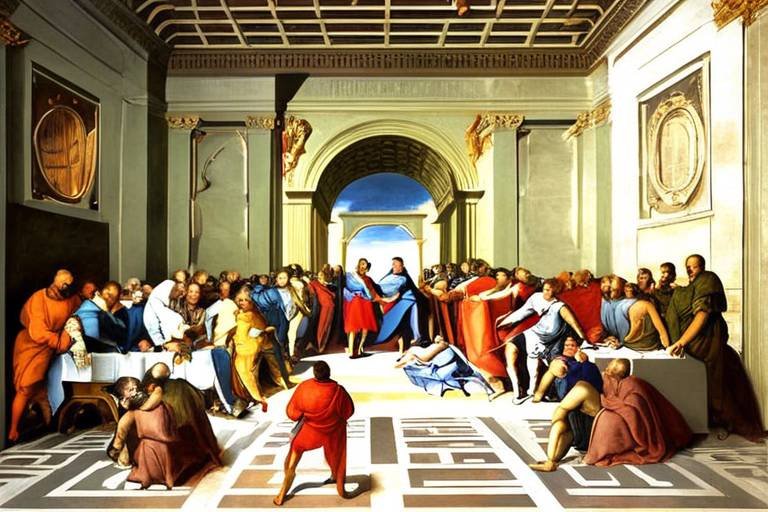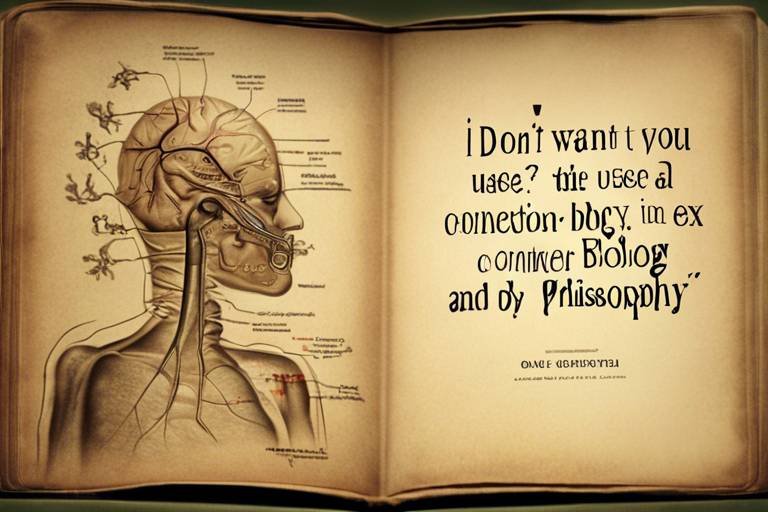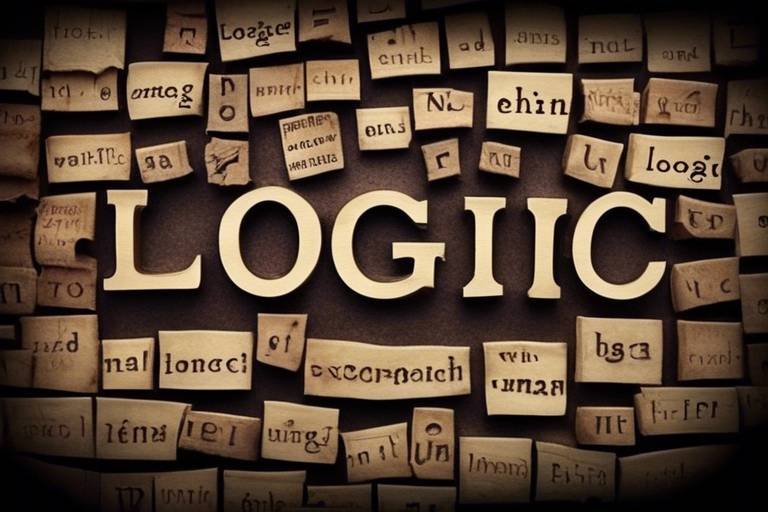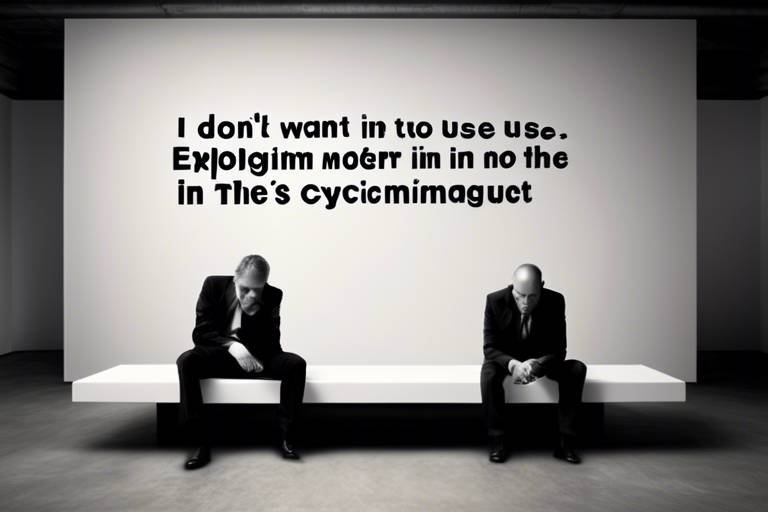Overview of Machiavellian Principles in Philosophy
Machiavellianism is a term that often evokes strong emotions, ranging from admiration to disdain. At its core, this philosophy, rooted in the works of Niccolò Machiavelli, offers a unique lens through which we can view the dynamics of power, politics, and human behavior. Born during the turbulent times of the Renaissance, Machiavelli's ideas emerged as a response to the complex political landscape of his era. His seminal work, The Prince, serves as a guide for rulers on how to navigate the treacherous waters of governance, emphasizing the need for a pragmatic approach that often prioritizes results over ethics.
The essence of Machiavellian thought is encapsulated in the notion that the ends often justify the means. This principle challenges the traditional moralistic views of leadership, suggesting that in the quest for power and stability, leaders may need to engage in actions that could be deemed unethical. For instance, Machiavelli famously argued that a ruler must be both a lion and a fox: strong enough to intimidate foes and cunning enough to outsmart opponents. This duality is not just a strategy; it reflects a deeper understanding of human nature and the often harsh realities of political life.
As we delve deeper into Machiavelli's philosophy, we will uncover key principles such as the nature of power, the tension between pragmatism and idealism, and the complex relationship between morality and politics. Each of these elements reveals how Machiavelli's insights remain relevant, even in today's political climate, where leaders grapple with ethical dilemmas and the pursuit of power.
In summary, Machiavellian principles challenge us to reconsider our understanding of politics and ethics. They invite us to engage in a dialogue about the necessary, albeit uncomfortable, realities of leadership. As we explore these concepts further, we will not only gain a deeper appreciation for Machiavelli's contributions to political thought but also reflect on their implications for modern governance.

[Historical Context of Machiavellianism]
To truly understand the essence of Machiavellianism, one must first step back into the Renaissance period, a time of profound transformation in Europe. This era, spanning from the 14th to the 17th century, was marked by a revival of classical learning and a questioning of traditional authority. In the midst of this cultural upheaval, Niccolò Machiavelli, an Italian diplomat, philosopher, and historian, emerged as a pivotal figure whose ideas would challenge the very fabric of political thought.
The political landscape of Machiavelli's time was tumultuous. Italy was not a unified nation but a collection of city-states, each vying for power and influence. The constant warfare among these states created a backdrop of instability, leading Machiavelli to ponder the nature of power and governance. His experiences as a diplomat exposed him to the cunning strategies employed by rulers, which ultimately shaped his views on political realism. He observed that the idealistic notions of leadership often crumbled in the face of harsh realities.
Machiavelli's most famous work, The Prince, written in 1513, reflects this historical context. It serves as a guide for rulers on how to acquire and maintain power, often advocating for a pragmatic approach that prioritizes effectiveness over morality. In a world rife with betrayal and shifting allegiances, Machiavelli argued that a successful leader must be willing to set aside ethical considerations for the sake of stability and control.
The Renaissance was also a time of significant philosophical evolution. Thinkers like Plato and Aristotle had laid the groundwork for political philosophy, yet their ideas often emphasized virtue and moral responsibility. Machiavelli diverged sharply from these traditions, suggesting that the complexities of human nature and the unpredictability of political life demanded a more realistic, sometimes ruthless, approach. He famously stated, “The ends justify the means,” encapsulating his belief that achieving political stability could necessitate morally questionable actions.
Furthermore, the rise of humanism during the Renaissance played a crucial role in shaping Machiavelli's thoughts. Humanism emphasized the value of individual experience and empirical evidence over abstract ideals. This shift allowed Machiavelli to focus on the practicalities of governance, urging leaders to be adaptable and shrewd in their decision-making. His ideas were revolutionary, challenging the prevailing notions of divine right and ethical governance, and laying the groundwork for modern political theory.
In summary, the historical context of Machiavellianism is rooted in the chaotic political landscape of Renaissance Italy, the philosophical shifts towards humanism, and the pragmatic realities of leadership. Machiavelli's insights emerged as a response to the challenges of his time, offering a lens through which to view the complexities of power and human behavior. His legacy continues to provoke discussion and debate, as the principles he outlined resonate in today’s political discourse.

[Key Principles of Machiavellian Philosophy]
Machiavellian philosophy is often viewed through a lens of intrigue and controversy, primarily due to its unfiltered examination of political power and ethics. At its core, Machiavelli's thought revolves around a few key principles that challenge traditional views of morality in governance. One of the most notable principles is the significance of power. For Machiavelli, power is not just a means to an end; it is the very essence of political life. He argues that to govern effectively, one must understand the dynamics of power—how it is acquired, maintained, and sometimes lost. This perspective offers a stark contrast to the idealistic notions of leadership that prioritize virtue and ethics over results.
Another foundational principle is pragmatism, which Machiavelli champions as essential for effective governance. He believes that leaders should be more concerned with the outcomes of their actions rather than adhering strictly to moral codes. This pragmatic approach often leads to decisions that might seem ruthless or unethical but are justified by the results they yield. To illustrate this, consider a leader who must choose between a morally right action that could lead to chaos and a morally questionable action that ensures stability. Machiavelli would argue that the latter is the more prudent choice, as it serves the greater good of the state.
However, this raises an intriguing question: where does morality fit into Machiavellian philosophy? Machiavelli does not dismiss morality entirely; instead, he redefines it within the political context. He suggests that while ethical behavior is important, it should not overshadow the necessity of maintaining power and order. In fact, he posits that a ruler may need to act immorally at times to protect the state. This complex relationship between morality and politics is what makes Machiavelli's ideas both compelling and contentious.
To further explore these principles, we can summarize them in the following table:
| Principle | Description |
|---|---|
| Power | The central focus of Machiavellian thought; understanding how to acquire and maintain power is crucial for any political leader. |
| Pragmatism | Prioritizing practical outcomes over moral ideals; leaders should make decisions based on effectiveness rather than ethics. |
| Morality in Politics | A nuanced view of morality; while ethical behavior is valued, it may be set aside for the sake of political stability. |
These principles form the bedrock of Machiavellian philosophy and provide a framework for understanding the often harsh realities of political life. By embracing power, pragmatism, and a redefined morality, Machiavelli offers a lens through which to analyze not just historical leaders but also contemporary political figures. This philosophy invites us to ponder: Are we willing to sacrifice our ideals for the sake of effective governance? Or can we find a balance between the two?
- What is Machiavellianism? - Machiavellianism refers to a political philosophy derived from the works of Niccolò Machiavelli, emphasizing the use of cunning and duplicity in statecraft.
- Is Machiavellianism ethical? - The ethics of Machiavellianism are highly debated; some view it as pragmatic while others see it as morally questionable.
- How does Machiavelli's philosophy apply today? - Many modern political leaders and theorists draw on Machiavelli's ideas to navigate the complexities of contemporary governance.

[The Nature of Power]
When we dive into the depths of Machiavellian philosophy, one concept stands out above the rest: power. For Machiavelli, power isn’t just a political tool; it’s the very essence of governance. Think of it as the engine that drives the state. Without power, a ruler is like a ship without a sail, drifting aimlessly in the turbulent waters of politics. Machiavelli understood that to lead effectively, one must not only acquire power but also know how to maintain it. This leads us to the question: What does Machiavelli really mean when he talks about power?
At its core, Machiavelli defines power as the ability to influence or control the actions of others. This influence can be exerted through various means—be it through fear, respect, or manipulation. In his seminal work, The Prince, he outlines the different ways leaders can acquire power, such as through inheritance, force, or cunning. It’s essential to note that Machiavelli views power not as a moral absolute, but as a practical necessity. In his eyes, the ends often justify the means, which can lead to some rather controversial conclusions about how leaders should act.
To further understand Machiavelli's perspective, let’s break down the significance of power into a few key points:
- Acquisition: Power can be gained through various methods, including military force, political alliances, and strategic marriages.
- Maintenance: Once power is acquired, it must be preserved. This can involve making tough decisions that may not align with traditional moral values.
- Influence: The ability to sway public opinion and manipulate perceptions is crucial for a ruler’s longevity.
Machiavelli also emphasizes the importance of adaptability in leadership. A ruler must be like water, able to flow around obstacles and adjust to changing circumstances. This adaptability is not merely about being reactive; it’s about being proactive in shaping one's environment. For instance, a leader who can anticipate challenges and pivot accordingly is much more likely to retain power than one who clings stubbornly to outdated methods or ideals.
Another fascinating aspect of Machiavelli's view on power is its dual nature. On one hand, power can be a force for stability and order; on the other, it can lead to tyranny and oppression. This duality raises an important question: Can power be wielded ethically? Machiavelli suggests that while ethical considerations are important, they often take a backseat to the practicalities of governance. The ruler’s primary responsibility, in his view, is to maintain the state and ensure its survival, even if that means making morally questionable decisions.
In conclusion, the nature of power in Machiavellian philosophy is complex and multifaceted. It is not merely a tool for domination but a fundamental aspect of political life that requires careful negotiation, strategic thinking, and sometimes, a willingness to forego ethical norms. As we continue to explore Machiavelli’s ideas, it’s crucial to remember that understanding power is not just about recognizing its existence; it’s about grasping the responsibilities and consequences that come with it. After all, with great power comes great responsibility—or does it?

[Pragmatism vs. Idealism]
When we dive into the world of politics and governance, one of the most intriguing debates revolves around pragmatism and idealism. Machiavelli, with his keen insights, firmly places his bets on pragmatism. But what does that really mean? In simple terms, pragmatism is all about being practical and focusing on the outcomes, while idealism tends to lean towards lofty ideals and moral principles. Imagine a ship sailing through stormy seas: a pragmatic captain would adjust the sails to navigate through the waves, while an idealistic captain might insist on following a predetermined route, regardless of the conditions.
Machiavelli's advocacy for pragmatism stems from his belief that political leaders must be adaptable and responsive to the realities of their environment. He understood that the world is often messy and unpredictable, and leaders cannot afford to be tied down by rigid moral codes or utopian visions. Instead, they should embrace a flexible approach that prioritizes results over ideals. This perspective is particularly relevant in today’s political landscape, where leaders often face complex challenges that require quick thinking and decisive action.
In contrast, idealism often champions the notion that leaders should strive for ethical standards and moral integrity. While these are commendable traits, Machiavelli warns that they can lead to naivety. He argues that idealistic leaders may become blind to the darker aspects of human nature and the political arena. For example, a leader who refuses to engage in deceit might find themselves outmaneuvered by more cunning opponents. Therefore, the crux of Machiavelli's argument is that, while ideals are important, they should not overshadow the necessity of practical decision-making.
This dichotomy between pragmatism and idealism raises several questions: Should leaders prioritize ethical principles, or should they focus on achieving tangible results? Can a balance be struck between the two? Machiavelli seems to suggest that the most effective leaders are those who can navigate this delicate balance, using idealism as a guiding star while remaining grounded in the practical realities of governance.
To illustrate this further, let’s consider a few examples of how pragmatism and idealism manifest in political leadership:
| Aspect | Pragmatism | Idealism |
|---|---|---|
| Decision-Making | Focuses on outcomes and effectiveness | Emphasizes moral values and principles |
| Adaptability | Willing to change tactics based on circumstances | Sticks to a set of ideals, regardless of the situation |
| Leadership Style | Realistic and results-oriented | Visionary and principled |
Ultimately, Machiavelli’s insights remind us that while ideals can inspire us, it is the pragmatic application of those ideals that often leads to successful governance. In a world where political landscapes shift like sand, being adaptable and results-driven can make all the difference between a thriving state and one that crumbles under the weight of its own principles.
- What does Machiavelli mean by pragmatism?
Pragmatism, in Machiavelli's context, refers to a practical approach to politics that prioritizes effective outcomes over strict adherence to moral ideals. - How does idealism differ from pragmatism?
Idealism focuses on moral principles and ethical standards, while pragmatism emphasizes practical results and adaptability in decision-making. - Can a leader be both pragmatic and idealistic?
Yes, the most effective leaders often find a balance between the two, using ideals to guide them while remaining flexible to the realities of their political environment.

[Morality in Politics]
The relationship between morality and politics is a complex tapestry woven with threads of ethics, power, and human nature. In Machiavelli's view, politics is not merely a realm of idealistic aspirations but a gritty battlefield where leaders must navigate treacherous waters. He famously asserted that the ends often justify the means, a perspective that raises eyebrows and ignites debates among scholars and practitioners alike. But what does this really mean for the moral compass of political leaders?
To understand Machiavelli's stance, we must first recognize that he lived in a time marked by political instability and corruption. The Renaissance period was rife with intrigue, betrayal, and shifting alliances. In such an environment, Machiavelli argued that a ruler's primary responsibility is to maintain the state and ensure its stability, sometimes at the expense of conventional morality. This pragmatic approach often leads to a stark contrast between the moral obligations of a leader and the harsh realities of governance.
For Machiavelli, the concept of morality in politics is not black and white; rather, it exists in shades of gray. He believed that a successful ruler must be willing to act immorally when necessary. This does not mean that Machiavelli advocates for outright cruelty or tyranny; instead, he emphasizes the importance of pragmatism over idealism. A ruler must possess the wisdom to discern when to uphold moral values and when to set them aside for the greater good of the state.
Consider the following scenarios that illustrate Machiavelli's perspective:
- Strategic Alliances: A leader may need to form alliances with morally questionable individuals or groups to secure peace or prevent conflict. This can be seen as a necessary evil to maintain stability.
- Public Deception: Sometimes, a ruler may find it essential to deceive the public for the sake of national security or to prevent panic. While this might conflict with ethical transparency, it can be argued as a pragmatic choice.
- Utilitarian Decisions: In dire situations, a leader might prioritize the welfare of the majority over the rights of a few, raising ethical dilemmas about justice and fairness.
These examples highlight Machiavelli's belief that political leaders must often operate in a moral gray area. The challenge lies in balancing ethical considerations with the need to make tough decisions. Critics of Machiavellianism argue that this approach can lead to a slippery slope where any action can be justified in the name of political expediency. However, supporters contend that understanding the complexities of human behavior is essential for effective governance.
Ultimately, the question remains: can a political leader truly be moral in a world where power dynamics dictate actions? Machiavelli suggests that while morality is important, it is not the sole guiding principle. Instead, a ruler's ability to adapt, respond to challenges, and prioritize the state's interests often takes precedence. This nuanced understanding of morality in politics continues to resonate in contemporary discussions about ethical leadership and governance.
1. What does Machiavelli mean by "the ends justify the means"?
Machiavelli suggests that the outcomes of political actions can justify the methods used to achieve them, even if those methods are morally questionable.
2. Is Machiavelli advocating for immorality in politics?
Not necessarily. Machiavelli emphasizes pragmatism and the necessity of making difficult choices for the greater good of the state, rather than promoting outright immorality.
3. How do modern leaders interpret Machiavelli's principles?
Many modern leaders adapt Machiavelli's ideas to navigate complex political landscapes, often balancing ethical considerations with practical needs in governance.

[Influence on Modern Political Thought]
Machiavelli's ideas have left an indelible mark on modern political thought, shaping how we perceive power, governance, and ethics today. His work, particularly "The Prince," acts as a cornerstone for understanding the mechanics of political power. In a world that often feels like a chess game, where every move is calculated and strategic, Machiavelli provides the playbook. But how exactly do his principles resonate in today's political landscape?
Firstly, the concept of power as a critical element of political life has been embraced by leaders and theorists alike. Modern politicians often find themselves in a Machiavellian dilemma, where the pursuit of power can lead to ethical compromises. This notion is evident in various political strategies employed across the globe, where leaders prioritize maintaining authority over adhering strictly to moral codes. For instance, consider how some political figures justify controversial decisions in the name of national interest or stability. It raises the question: at what point does the pursuit of power overshadow ethical governance?
Moreover, Machiavelli's emphasis on pragmatism over idealism is particularly relevant in contemporary politics. In an era marked by rapid change and complex global issues, leaders often adopt a practical approach to governance. They must navigate a landscape filled with competing interests, societal expectations, and international pressures. This pragmatic lens allows for flexibility and adaptability, qualities that are increasingly necessary in today’s fast-paced world. Interestingly, many political analysts argue that this pragmatic approach can lead to a more effective government, one that is responsive to the needs of its citizens rather than bound by rigid ideologies.
Another significant aspect of Machiavelli's influence is the ongoing debate about the role of morality in politics. While some argue that ethical considerations should guide political decisions, others believe that a more Machiavellian approach is necessary to achieve results. This tension between morality and effectiveness is a hot topic among political theorists and practitioners. For example, leaders might justify surveillance programs or military interventions by citing the need for security, raising ethical concerns that echo Machiavelli's own reflections on the harsh realities of political life.
Furthermore, Machiavelli's ideas have transcended traditional political boundaries and have found their way into various fields, including business and international relations. In the corporate world, the concept of "the ends justify the means" is often employed to navigate competitive environments. Similarly, in international diplomacy, the strategic maneuvers reminiscent of Machiavellian tactics are commonplace. This cross-disciplinary relevance highlights the enduring nature of his principles, suggesting that the quest for power and control is a universal human endeavor.
To illustrate the impact of Machiavelli's principles on modern political thought, consider the following table that outlines key areas of influence:
| Area of Influence | Modern Application |
|---|---|
| Power Dynamics | Political leaders often focus on maintaining control, sometimes at the expense of ethical considerations. |
| Pragmatism | Governments adopt flexible policies to adapt to changing circumstances rather than adhering to rigid ideologies. |
| Ethics in Politics | The debate continues over the balance between ethical governance and effective leadership. |
| Cross-disciplinary Influence | Machiavellian principles are applied in business strategies and international relations. |
In conclusion, Machiavelli's influence on modern political thought is profound and multifaceted. His ideas challenge us to reconsider the relationship between power, ethics, and governance. As we navigate the complexities of today's political landscape, understanding Machiavellian principles can provide valuable insights into the motivations and strategies of those in power. It's a reminder that, in politics, the game is often as important as the players.
- What are the main ideas of Machiavelli? Machiavelli's main ideas revolve around the nature of power, the importance of pragmatism in governance, and the complex relationship between ethics and politics.
- How does Machiavelli's philosophy apply to modern politics? His philosophy is reflected in the way modern leaders navigate power dynamics, often prioritizing effectiveness over strict adherence to moral principles.
- Is Machiavelli considered a political realist? Yes, Machiavelli is often regarded as a foundational figure in political realism, emphasizing the practical aspects of political life over idealistic visions.

[Critiques of Machiavellianism]
Machiavellianism, while a cornerstone of political philosophy, has not gone unchallenged. Critics have raised a plethora of concerns regarding its ethical implications and the pragmatic approach it advocates. Many argue that Machiavelli's ideas promote a cynical view of human nature and governance, reducing complex moral dilemmas to mere power plays. This critique is especially relevant in today's political climate, where the line between ethical leadership and ruthless ambition often blurs.
One of the most significant critiques revolves around the notion that Machiavelli's principles encourage deception and manipulation. Critics argue that by endorsing the idea that "the ends justify the means," Machiavelli opens the door for leaders to engage in unethical behavior, undermining trust in political institutions. This perspective raises the question: can a society thrive when its leaders prioritize power over principle? The potential for corruption and abuse of power becomes a glaring concern, leading many to argue that Machiavelli's philosophy is fundamentally flawed.
Furthermore, the ethical implications of Machiavellianism are hotly debated. The idea that morality can be sidelined in the pursuit of political success poses significant challenges. For instance, when leaders act solely based on pragmatic considerations, they risk alienating constituents who expect ethical governance. This can lead to a disillusioned populace, questioning the integrity of their leaders and the political system as a whole. The following table outlines some of the key ethical dilemmas posed by Machiavellianism:
| Ethical Dilemma | Description |
|---|---|
| Deception | The use of lies and manipulation to achieve political goals. |
| Power vs. Morality | The tension between gaining power and adhering to moral principles. |
| Public Trust | The erosion of trust in political leaders and institutions. |
| Consequentialism | The idea that outcomes justify unethical actions. |
Another point of contention is the perception of human nature that Machiavelli's work implies. Critics often argue that his view is overly pessimistic, suggesting that humans are inherently self-interested and power-hungry. This perspective can lead to a self-fulfilling prophecy where leaders, believing that others are inherently untrustworthy, act in ways that perpetuate a cycle of distrust and manipulation. In contrast, many modern political theorists advocate for a more optimistic view of human nature, suggesting that cooperation and ethical behavior can lead to more stable and prosperous societies.
Moreover, modern interpretations of Machiavelli's work have also sparked debate. While some scholars argue that his ideas are relevant in understanding contemporary political dynamics, others contend that applying his principles to today's governance is misguided. The complexities of modern society, with its emphasis on democratic values and human rights, often clash with Machiavellian pragmatism. This divergence raises important questions about the applicability of Machiavelli's ideas in a world that increasingly values transparency and accountability.
In conclusion, while Machiavelli's contributions to political philosophy are undeniable, the critiques surrounding his work highlight significant ethical concerns and the complexities of human behavior in governance. As we navigate the political landscape today, it is essential to engage with these critiques thoughtfully, considering how they inform our understanding of power, morality, and leadership.
- What are the main criticisms of Machiavellianism? Critics argue that it promotes unethical behavior, encourages deception, and fosters distrust in political leaders.
- How does Machiavellianism view human nature? Machiavelli is often seen as having a pessimistic view, suggesting that humans are primarily self-interested and power-hungry.
- Can Machiavellian principles be applied in modern politics? While some believe they are relevant, others argue that today's values of democracy and ethics conflict with Machiavellian pragmatism.

[Ethical Implications]
The ethical implications of Machiavellianism are a hotbed of debate, stirring up discussions that can feel as intense as a political campaign. At its core, Machiavelli's philosophy often challenges our understanding of morality in politics. He proposes that the pursuit of power may require leaders to engage in actions that, under normal circumstances, would be deemed unethical. This leads to a fundamental question: Is it acceptable to compromise moral values for the sake of political stability? In a world where the ends often justify the means, Machiavelli's ideas can make even the most principled individuals squirm.
One of the most contentious points is the notion that rulers may need to act immorally to maintain their power. This idea raises eyebrows and ignites discussions about the very fabric of ethical governance. For instance, consider a leader who must decide whether to deceive the public to avoid panic during a national crisis. While some might argue that this deception serves the greater good, others would contend that it undermines trust and integrity, essential components of effective leadership.
To better understand the ethical dilemmas posed by Machiavellianism, let’s break down some key concerns:
- Ends Justifying the Means: Machiavelli famously stated that the outcome of actions is what ultimately matters. This perspective can lead to a slippery slope where unethical behavior becomes normalized in the pursuit of success.
- Manipulation and Deception: The use of manipulation as a tool for political gain raises questions about authenticity in leadership. Can a leader who employs deceit ever be truly respected?
- Impact on Society: The broader implications of Machiavellian tactics can erode public trust in institutions, leading to a society where cynicism reigns and ethical standards are compromised.
Furthermore, the ethical implications of Machiavellianism extend beyond individual leaders to entire political systems. When leaders prioritize power over principle, it can create an environment where corruption flourishes. This is evident in many historical examples where regimes have fallen due to the very tactics that Machiavelli might have endorsed. The question then becomes: How can societies reconcile the need for strong leadership with the imperative of ethical governance?
Machiavelli's legacy is a double-edged sword. On one hand, his insights into the nature of power and human behavior are invaluable; on the other hand, they pose serious ethical challenges. As we navigate the complexities of modern politics, it’s essential to reflect on how these principles apply today. Are we willing to accept that some leaders may act unethically if it serves a perceived greater good? Or do we hold steadfast to the belief that integrity must remain at the forefront of political life?
Ultimately, the ethical implications of Machiavellianism compel us to engage in ongoing discussions about morality, power, and the responsibilities of leadership. As we ponder these questions, it’s crucial to remember that the choices made by those in power can have lasting impacts on society. The challenge lies in finding a balance between pragmatism and ethical responsibility—an endeavor that is as relevant today as it was in Machiavelli's time.
- What is Machiavellianism? Machiavellianism refers to a political philosophy attributed to Niccolò Machiavelli, emphasizing the use of cunning and duplicity in statecraft.
- Are Machiavellian principles still relevant today? Yes, many of Machiavelli's ideas are reflected in modern political strategies and leadership styles.
- Can ethical leadership exist within a Machiavellian framework? This is a debated topic; some argue that ethical leadership can coexist with Machiavellian tactics, while others believe they are fundamentally at odds.

[Modern Interpretations]
Machiavelli's ideas have not only withstood the test of time but have also been reinterpreted to fit the complexities of modern governance. In a world where political landscapes shift rapidly, the application of Machiavellian principles can be seen in various forms across the globe. For instance, leaders today often embrace a pragmatic approach, similar to Machiavelli's advice, focusing on results rather than adhering strictly to moral codes. This shift raises the question: Can effective leadership exist without a moral compass?
One of the most significant modern interpretations of Machiavellianism is its adaptation in the realm of corporate governance. Many business leaders adopt Machiavellian strategies to navigate competitive markets. They prioritize power dynamics, strategic alliances, and sometimes ruthless decision-making to achieve success. In this context, the phrase “the end justifies the means” resonates strongly, as executives often weigh the benefits of their decisions against potential ethical dilemmas.
Moreover, political strategists and analysts frequently reference Machiavelli when devising campaign strategies. The concept of utilizing information and psychological tactics to influence public opinion is very much in line with Machiavellian thought. For example, the use of targeted advertising and social media manipulation in recent elections reflects a Machiavellian approach to achieving political power. This raises a crucial point: do these strategies undermine democratic values, or are they simply a reflection of modern political realities?
Interestingly, Machiavelli's ideas have also found a place in discussions about international relations. Realpolitik, a term often associated with Machiavellianism, emphasizes a pragmatic and strategic approach to diplomacy, where moral considerations take a back seat to national interests. This approach has been evident in various geopolitical maneuvers, where countries prioritize their survival and power over ethical considerations. The implications of this can be profound, leading to a world where might often dictates right.
To illustrate the impact of Machiavellian principles in modern contexts, consider the following table that outlines some key areas where his influence is evident:
| Area | Machiavellian Principle | Modern Application |
|---|---|---|
| Corporate Governance | Pragmatism | Strategic decision-making for profitability |
| Political Campaigning | Manipulation of Public Opinion | Use of targeted ads and social media |
| International Relations | Realpolitik | National interests over ethical considerations |
In conclusion, Machiavelli's principles have evolved, adapting to the nuances of contemporary society. Whether in business, politics, or international relations, his insights on power, pragmatism, and strategic thinking remain relevant. As we navigate the complexities of modern life, it’s essential to reflect on how these interpretations shape our understanding of leadership and ethics. Are we, perhaps, more Machiavellian than we’d like to admit?
- What is Machiavellianism? Machiavellianism refers to a political theory developed by Niccolò Machiavelli, emphasizing the use of cunning and deceit in political leadership.
- How do modern leaders apply Machiavellian principles? Modern leaders apply these principles through pragmatic decision-making, strategic manipulation, and prioritizing results over ethical concerns.
- Is Machiavelli's philosophy still relevant today? Yes, Machiavelli's philosophy remains relevant as it provides insights into power dynamics and leadership strategies in various fields.
- What are some criticisms of Machiavellianism? Critics argue that Machiavellianism promotes unethical behavior and undermines trust in leadership.
Frequently Asked Questions
- What are the core principles of Machiavellian philosophy?
Machiavellian philosophy revolves around several key principles, including the significance of power, the necessity of pragmatism over idealism, and the complex relationship between morality and politics. These principles emphasize that effective governance often requires a realistic approach to power dynamics and ethical considerations.
- How does historical context influence Machiavellianism?
The historical context of the Renaissance period played a crucial role in shaping Machiavelli's ideas. The turbulent political landscape of Italy at that time, characterized by shifting alliances and power struggles, influenced his thoughts on leadership and the necessity of pragmatic decision-making in governance.
- What is the nature of power according to Machiavelli?
Machiavelli defines power as a central element of political leadership. He argues that power is not only about authority but also about the means through which it is acquired and maintained. Understanding this dynamic is essential for any leader who wishes to navigate the complexities of political life.
- Does Machiavelli believe morality has a place in politics?
Yes, but with a caveat. Machiavelli acknowledges that morality is often at odds with political necessity. He suggests that while ethical behavior is important, leaders may need to set aside traditional moral values to achieve their political goals, highlighting a contentious balance between ethics and effective governance.
- What are some critiques of Machiavellianism?
Machiavellianism has faced substantial criticism, particularly regarding its perceived cynicism and ethical implications. Critics argue that his ideas promote manipulation and deceit in politics, raising important moral questions about the consequences of adopting such a pragmatic approach.
- How are Machiavelli's ideas interpreted in modern political thought?
Modern political thinkers often reinterpret Machiavelli's principles to address contemporary issues. His emphasis on pragmatism and power dynamics can be seen in various political strategies today, as leaders navigate complex global challenges while balancing ethics and effectiveness.



















